Jan. 7, 2021
How deep is the impact of a non-season on the Dinos?

March 2020: Women’s Volleyball National Championship — cancelled. April 2020: Night of the Dino — cancelled. June 2020: All fall sports (field hockey, soccer, football, women’s rugby) — cancelled. July 2020: Golf and cross-country running — cancelled. October 2020: Hockey, basketball, volleyball and wrestling — cancelled. December 2020: Swimming and track and field — cancelled.
Football drills in socially distanced quadrants. Masked players in gyms. Positive tests. Customized Zoom workouts. Lonely long-distance runs.
Cancelled. Postponed. Training. Repeat. Copy that.
- Pictured above, from left: Dinos athletes Logan Bandy, Reyna Crawford, Stefan Daniel, Dakota Krebs, Maiya Lee and Ezeoha Santiago
For the 550 varsity and 250 club athletes who call UCalgary home, this has been life for the past 10 months. Since last March, every university sport has been fundamentally disrupted by the coronavirus pandemic. Jason Kerswill, director of athletics for UCalgary Dinos, says there have been too many heartbreaking and agonizing moments to name.
Amidst a pandemic that has shut down so many facets of life, should university sports even matter?
“Sports are a community touchstone, and the rhythms that games and annual competitions invoke are often anchors in many people’s lives,” says Kerswill, who is also the chair of the COVID taskforce for Canada West. “Sports are often what galvanizes student-athletes with alumni and the community.”
As COVID-19 continues to wreak chaos on the university sports landscape, Kerswill hopes that “athletes have used this unexpected time that COVID has given us to boost personal development and individual talents . . . perhaps leaving athletes more well-rounded? We’ll soon see,” he adds optimistically, predicting that some teams will soon train together again.
Nevertheless, no one disputes that the COVID-19 world has been an anxious one for athletes — precisely why we recently checked in with six Dinos about their current situation, one that continues to be submerged in “what if?” questions. Such as:
What if you don’t get to play varsity basketball again?
Fourth-year women’s basketball star Reyna Crawford is set to graduate in the spring with a Bachelor of Science in biomechanics but, as a U Sports athlete, she’s eligible to play for five years. Planning on taking a master’s in biomechanics next fall, Crawford hopes another year of basketball with the Dinos is in her cards.
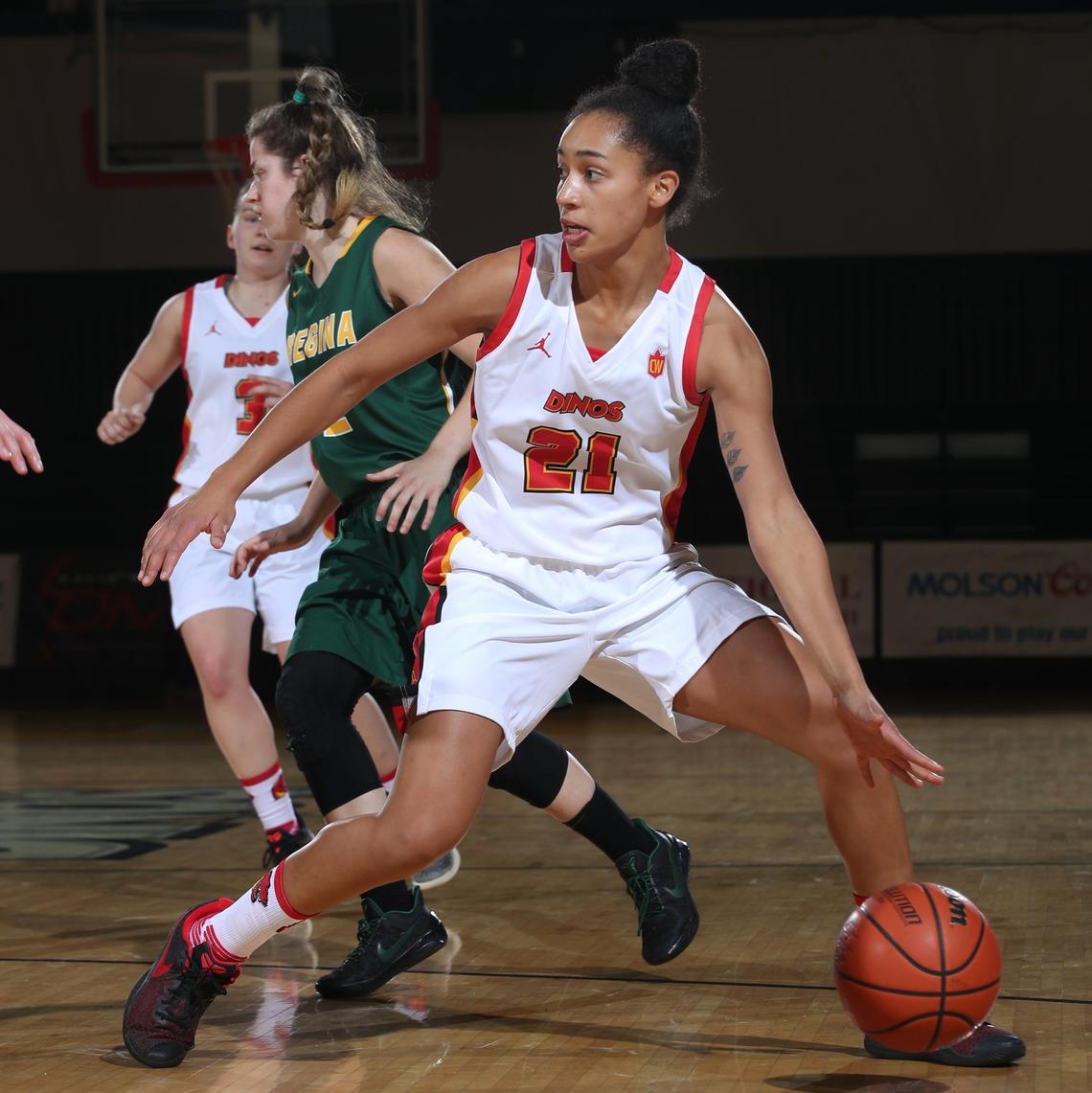
Reyna Crawford playing against the University of Regina in the 2018-2019 season.
David Moll
Besides longing for team practices and a wider social net, Crawford has missed home games the most.
“My whole family would come to the games,” says Crawford in an email. “It was so cool to look around and see so many of the people I love watching us just play a game that we genuinely love so much. After the craziness of game days, on Sundays, I would have family dinners where my sisters, my niece and grandparents would get together at my mom’s house and we would visit. Those were the best kind of weekend.”
There is one pivotal moment, in all its pre-pandemic haziness, that Crawford distinctly recalls when her old life stopped and a fuzzy new one began: “It was Oct. 15 and my three roommates and I were home when we got a group chat message from our head coach, Damian Jennings, telling us there would be no season,” she remembers.
“We all knew it was coming, but it was different seeing it in writing. In that instant, we had to question how the rest of our degrees were going to play out; what it meant for grad school; our living arrangements for next year; what we were going to do with our time; and even how we would deal with the emotional stress of knowing it was going to be a long time before we got to play the sport we love.”
If you could replay one day in pre-COVID times, what would that look like?
“That’s easy — I’d play football,” says offensive lineman Logan Bandy, who helped bring home the Vanier Cup in 2019, when the Dinos beat the University of Montreal Carabins 27-13. Although his entire fourth season with the Dinos has been a wash, he still hopes to enter the CFL draft this coming spring. Having spent so much of 2020 feeling frustrated and marooned, Bandy admits that, today, he even misses early morning workouts.
“I miss everything about football. Even those days when we’d work out in the morning, have classes all day and then top off our evenings with another practice. It’s weird, but I miss it. To have had all that ripped away from us this year has been heartbreaking.
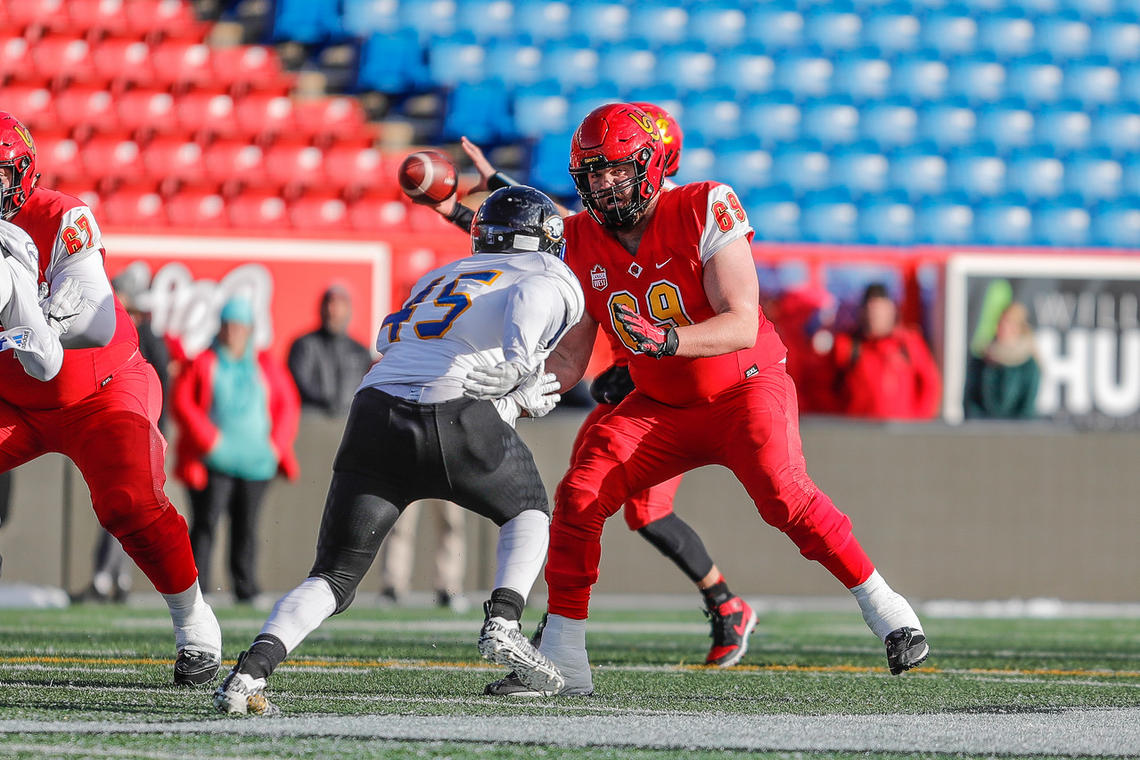
Dinos offensive lineman Logan Bandy at the last 2019 regular season game against UBC.
Andrew Doyle-Linden
Honestly, it’s still gutting to think that the Vanier Cup game could be the last game I play in a Dinos uniform.
Bandy is quick to point out the life lessons he’s learned — lessons he plans to take with him wherever that may be. “The biggest thing I’ve learned from the whole ordeal is that you cannot let anything become an excuse. There is always a way to get better, even if it means doing YouTube workouts in your basement for a couple days in a row.
"The pandemic has been tough for literally everyone, yet I find that it has been a character builder for myself. And with more time to complete assignments and to actually study, [it] has meant a higher GPA for me. I keep repeating, ‘Where there is a will, there is a way!’"
What if you never make it to nationals again?
Of course, fourth-year women’s soccer player Maiya Lee is relieved her team survived 2020, but is anyone truly thriving? Like so many athletes, she’s shocked herself by discovering a deeper capacity to tolerate frustration, anger and heartbreak. But still, to win Canada West last year and finish second at the nationals won’t be easy to repeat. That’s because seven of the team’s fifth-year players will graduate this year, making the 2021 season another growth year instead of the “experienced, packed team we would have had this last year,” Lee says.
Fourth-year soccer player Maiya Lee at the 2019 U Sports national semifinal match against the University of Toronto.
Armando Tura, Peter Oshkai
“In all honesty, it’s hard to find positives on this situation from an athletic standpoint,” says Lee, who has dreams of playing professional soccer in Europe after she graduates. “The detriments in training quality, especially for a team sport, are substantial. If anything, it’s been a good chance to focus on individual weaknesses and strengths, honing in on specific aspects of my own game that I want to improve on, but still.”
Yes, our Dinos are being philosophical and stalwart, however, there’s always a “but still.”
What if the pools don’t open?
For four years, one of the world’s paratriathlon champs, Stefan Daniel, had been training for the 2020 Tokyo Paralympics, only to see that snatched away. Also a Dinos cross-country runner and two-time team national winner, Daniel is now focused on next summer’s rescheduled games, but needs to do more than train solo. With all pools closed, he’s biking on his indoor trainer, has strength sessions over Zoom, runs outside and plans to join a triathlon camp in Victoria in January.
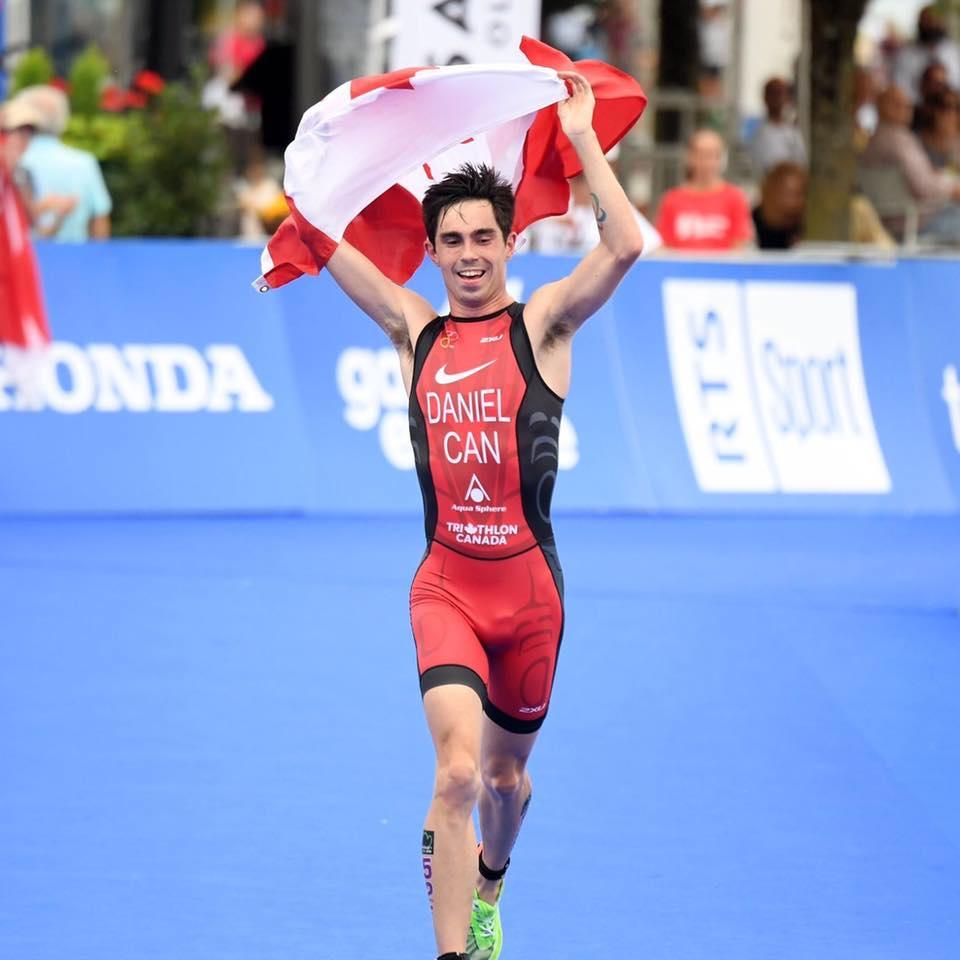
Paralympic silver medalist and UCalgary Dinos Cross-Country runner Stefan Daniel takes the 2019 Paratriathlon World Championship event in Lausanne, Switzerland.
Delly Carr/ ITU Media
Despite his inconsistent training regime compounded by a serious stress fracture in the top of his foot, Daniel says he is confident he’ll be ready for Tokyo, armed and grounded by a new sense of self.
“I always thought it was racing that motivated me to get out the door each morning, but I don’t think so anymore,” says Daniel. “I’ve realized that I just really like being active. It’s as simple as that. It’s the reason I started sport and COVID has reminded me that I don’t need racing to stay motivated. At the end of the day, I’m doing this sport for me, because I love it.”
What if you don’t get to play a game for a year or more?
It’s questions like that which can cause an athlete like Dakota Krebs to sleep until noon.
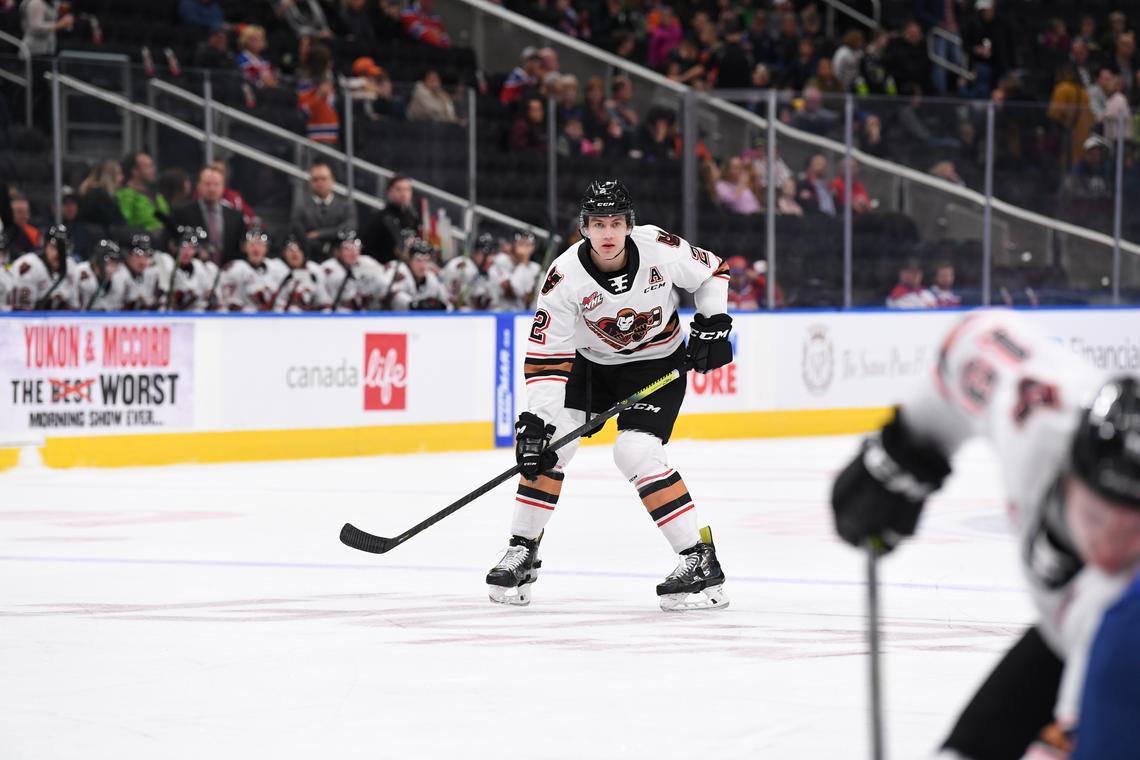
After three years of playing hockey with the Calgary Hitmen, Dakota Krebs chose to remain in the city and awaits his Dinos debut.
Candice Ward/Calgary Hitmen
“Yep, I was developing some very bad habits,” says the first-year Dinos hockey player, who played for the Calgary Hitmen for five years before joining the Dinos late last spring. “There’s been a lot of ups and downs for us. A player would get a cold and then we wouldn’t practice for four days. Then we’d be back and it would happen again and then we’d try to focus on what was going to happen next and it was wearing us down. Pretty soon there was a little TikTok, too many video games and not-so-great meals that I was shoveling into me. Then I decided to return home.”
Following his dad’s mantra, “control the controllables,” Krebs, these days, is now working out in the family Okotoks home gym with his siblings, waking up early, taking a cold shower, making his bed and Zooming in on his courses with the Haskayne School of Business.
“When I don’t have hockey, I get lazy because I don’t have to manage my time,” says Krebs, who, in a typical season, would devote a minimum of seven hours a week to hockey. “When you’re playing hockey and going to school, you can’t procrastinate. It may sound weird, but I am a more productive student due to hockey.”
What if you’re dealt a double-whammy — an injury as well as COVID?
For Ezeoha Santiago, the announcement zinged across the Dinos basketball team group chat, heralding one of those rare events that is truly life-changing. Santiago had not been having a stellar week. First, he’d torn his ACL during the national championships against the University of Alberta on March 7. And now this — a global pandemic?
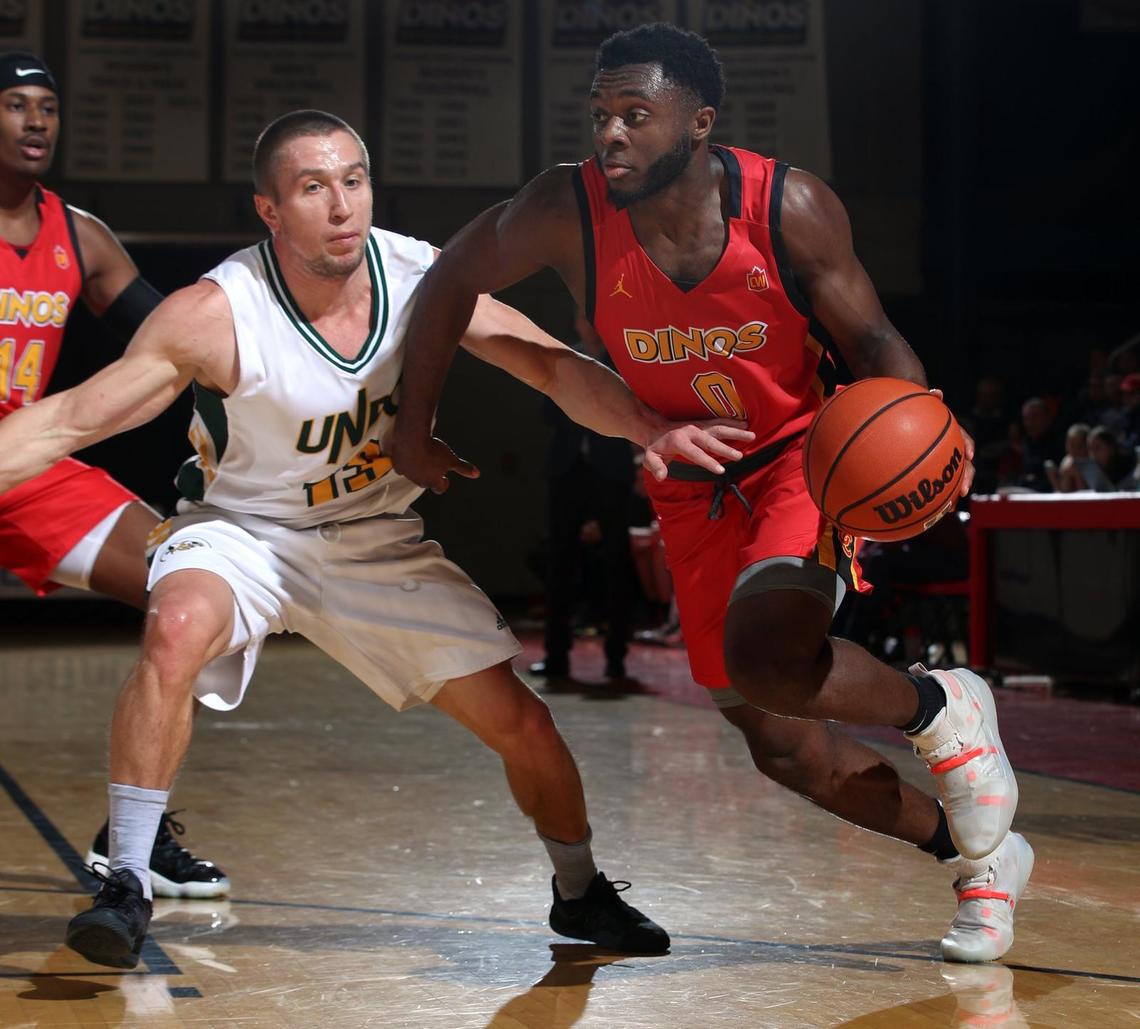
Ezeoha Santiago finished with 23 points at the Canada West Conference Games against UNBC Timberwolves.
David Moll
Forced to step away from basketball due to his injury and then COVID has left Santiago, he says, “a better student of the game. It’s allowed me to develop a greater appreciation for basketball’s technical and mental components.”
And, if that’s not enough, fourth-year Haskayne student Santiago lists off other silver linings: being able to focus exclusively on his academics (he’s boosted his GPA to 4.0) and practising something Santiago calls “radical acceptance.” This has allowed him to adopt an “it is what it is" mentality, which, he says, has opened up “new avenues for growth.”
While in recovery, Santiago landed an internship with a merchant bank called Palisades Goldcorp, giving him, “a real-world understanding of how the finance industry works. Honestly, it was a life-changing opportunity for me.”
Of course, there’s not a Dino who wouldn’t rather be playing their sport than working out over Zoom, but most, says Kerswill, have realized this pandemic hasn’t been fair.
“But I feel like a lot of athletes are going to come out stronger than they were, especially mentally,” he says. “We talk all the time about being resilient and handling adversity. These athletes will be better prepared for life than any other cohort.”
But still . . .






